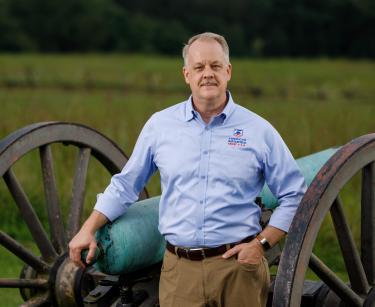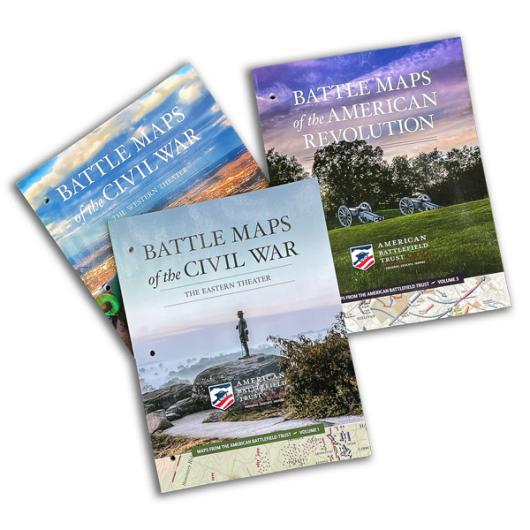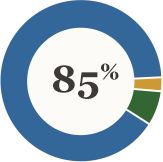Meet David Duncan of Fairfax, VA
An interview with a Color Bearer member
On March 20, 2000, after basically begging the new president Jim Lighthizer for the job, I joined the staff of the Trust, and 20 years later, I have the honor and privilege to take over from Jim Lighthizer as president as he retires with full honors! I never would have dreamed of this outcome as I wrote that first $20 check nearly a quarter of a century ago.
David Duncan, Color Bearer

American Battlefield Trust: What moved you to first give to our organization?
David: The first airing of the Ken Burns Civil War series in the early 1990s re-awakened a childhood interest in American history; my dad (a middle-school social studies teacher) also gave me a copy of The Killer Angels, which I read in a weekend, then started visiting every battlefield I could, and reading every Civil War and Revolutionary War history or biography I could get my hands on. Later, the Disney Company was considering building an open-air history-themed park (History America) too near the Manassas Battlefield, so that’s when I first became aware of the danger so many of the hallowed places I cared about faced from rampant development. I got a letter from a group called the Civil War Trust, which was fighting this development, and I sent in my first gift of $20 to join. That gift is still in our database dated March 22, 1996. Four years later on March 20, 2000, after basically begging the new president Jim Lighthizer for the job, I joined the staff of the Trust, and 20 years later, I have the honor and privilege to take over from Jim Lighthizer as president as he retires with full honors! I never would have dreamed of this outcome as I wrote that first $20 check nearly a quarter of a century ago.
What do you enjoy most about being a Color Bearer?
Two things: First, being with other Color Bearers (and really all members) who care passionately about preserving our history. I have made lifelong friends in this group, and those relationships have added immeasurably to my life. I cannot wait until the COVID crisis passes, and we can all gather together again. Second, because I am a self-proclaimed history geek, I love that we get to take the Color Bearers places that most people don’t get to see. We have dined on the grounds of Arlington House at night, with the city of Washington spread out below; we have toured UNDER the Lincoln Memorial; we have gotten up close and personal with the Gettysburg Cyclorama, had behind-the-scenes tours at any number of museums and historical societies, and so much more. I would encourage anyone who is considering it to become a Color Bearer… it is just such a joy to be part of a group of wonderful, like-minded people who care about the same mission you do.
What is your favorite battlefield you’ve visited?
Chancellorsville is my favorite Civil War battlefield. The drama of the entire battle, from beginning to end, is just such a great and compelling story to me. Plus, I like to reflect on how it was a hinge point of history. I know some folks don’t like to play “what if” scenarios with history, but just consider if Hooker had somehow managed to win that battle: would there still have been a Battle of Gettysburg? If no Battle of Gettysburg, there would be no need for Lincoln to deliver an address at a soldier cemetery there… perhaps there’s no need, a year later, for Grant to come east. Would he still have become president? Would Stonewall Jackson still have been shot by friendly fire? I know you can play this game with any moment in history, but it amplifies the importance of Chancellorsville to me to think about how our world would be very different today in Joe Hooker had not pulled back on that first day. I think it’s a tie between two Revolutionary War battlefields, Princeton in the North and Cowpens in the South. I truly believed that Washington’s personal courage on the field at Princeton that morning altered the course of the war – and talk about a “what if”? – what if the British volley had killed him that day, as it probably should have? Would we even have the country we love today? How different would it be? Then at Cowpens, I see that as the real beginning of the end for Cornwallis’ forces in the South. In less than an hour’s fighting, Daniel Morgan’s small army neutralized the striking force under the hated Banastre Tarleton, and set the stage for future victories. There’s still quite a bit of land at Chancellorsville which needs to be saved, and while there may still be some at Cowpens, it is a beautifully preserved battlefield.
If you could travel anywhere in the world, where would you go?
I’ve actually never been to the Grand Canyon, so that is definitely on my domestic bucket list. Internationally, I really want to go to the Normandy Beaches. As with battlefields here in America, I feel a very strong emotional pull to experience a place where so much was sacrificed, and where the outcome of a battle changed the trajectory of history. This may sound corny, but I often conclude my visits to a battlefield in a nearby soldier cemetery, and as I walk between the rows of headstones, reading the names and ages of those buried there, I often quietly tell them, “You are not forgotten…. You are not forgotten.” I do what I do – battlefield preservation – because I believe these events must never be forgotten. (I cry at the end of “Saving Private Ryan.” Every…single…time.)
If you could meet any historical figure, who would you choose and why?
Well, as long as we are wishing, I’d like to meet two, George Washington and Winston Churchill. I have more biographies on my bookshelf about Washington than any other person, and it is still difficult to know the man. To me, Washington’s greatest achievements were to, first, resign his military commission after the Revolutionary War, and then refuse a third presidential term. Very few people, if any, up to that period of time, voluntarily surrendered the power that he had amassed, creating something unique in the American story. But if you force me to choose just one, I would have to say Winston Churchill, who is in second place on my bookshelf. Although moderately successful before May 1940, he was the right man at the right moment in history for Europe, if not the world, when he became Prime Minister. It is hard to imagine what our world today might look like had Great Britain negotiated with Germany in those dark early days, but Churchill would not allow it. By his leadership, especially in the key 18 months before the United States entered the war, I believe he saved Western Civilization, and potentially millions of lives, from that time to this. No small accomplishment.
Anything else you want to share?
As a student of history’s conflicts, it distresses me to see how polarized our country has become in recent years, although… it is not as bad as it has been in some eras of our history. The study of history is great for giving perspective. But we must use these battlefields as teaching tools so that we never again reach the point where we break apart as a nation. In previous speeches, I used to point out that if the proportion of the population who perished during the Civil War was applied to our population today, it would equal nearly 6 million souls, a true holocaust that we must avoid. I pride myself on being good with words, but I cannot improve upon Lincoln’s First Inaugural: “We are not enemies, but friends. We must not be enemies. Though passion may have strained it must not break our bonds of affection.” I would hope that the model of the Civil War combatants who, by and large, embraced the spirit of reconciliation not long after they were mortal enemies, would be one that we could emulate today.









